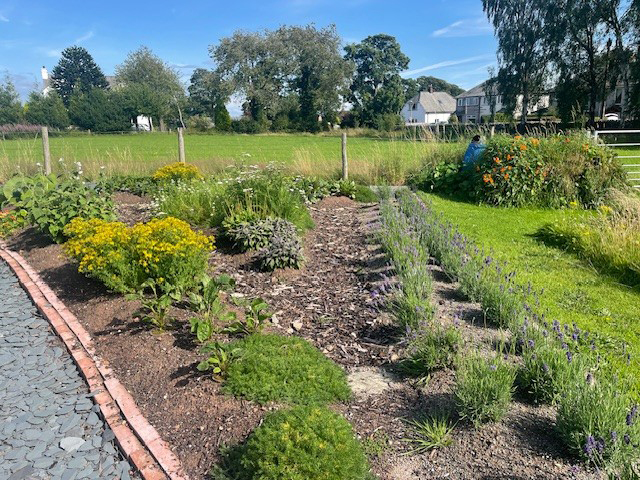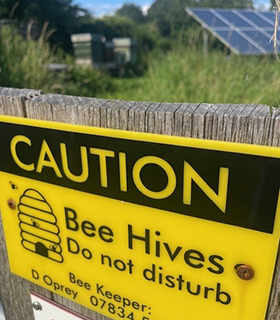Volunteers from around the globe dig in to help Friends in Cumbria
Refugees from across the world have been lending their gardening skills and their muscles to Quakers in South Cumbria. The volunteer team from Furness Refugee Support Group has been helping Swarthmoor Local Meeting to create biodiverse friendship gardens for both wildlife and visitors to enjoy.

"We have an acre of gardens as well as the burial ground, a small back field, and a photovoltaic array," explained Bill Shaw from Swarthmoor Meeting. "We brought in self-employed contractors to help us with the foundational works, and since then, the property committee and others have beavered away to transform the space into a haven for wildlife and a sanctuary for humans."
The meeting is very grateful for the support of weekly volunteers from the Furness Refugee Support Group. The group is a small, registered charity with no paid staff who support refugees and people seeking asylum who currently live in the Furness area. The charity helps with practical support, such as shopping, going to appointments and they provide a regular programme of learning, networking, and access to volunteering.
"We've been joined by refugees from Nigeria, Ethiopia, Iran, Afghanistan, Albania, Iraq and Vietnam and they've been an enormous help," said Bill. "They come one morning a week, we pay their travel expenses and ply them with snacks and refreshments."
At the front of the meeting house there are two small gardens managed for spring bulbs and ox-eye daisy. The central area of the burial ground is managed for native daffodils and other meadow herbs and grasses. The spaces around the central area are for wildlife habitat. Low growing native trees, that blossom and bear fruit and a hazel copse, have been planted as a wild orchard. In another area, domestic fruit trees have been planted to create a domestic orchard.
Dead woody material has been stacked to create short dead hedges, and ivy is being encouraged to grow over them.
It's hoped to slowly build more secure nesting places for small birds to protect them from the sparrow hawk who regularly hunts the site.
The small back field is used for social events and outdoor worship, so is mainly grass, some regularly mown to give easy access across and around it. A 'pollinator row' of shrubs and perennials has been planted along the boundary wall between the back field and the burial ground. This has lots of flowers to attract pollinating insects.
"The latest project has been to create a medicinal herb garden in one of the corners of the back field," Bill said. "The herb garden is maintained and harvested by a medicinal herbalist. "She also teaches children and young people medicinal herbalism in the meeting's barn room, using the Friendship Gardens to forage for the raw plant materials."
Behind the back field is the fenced off 42-panel photovoltaic array, producing renewable energy which feeds into the national grid.
"It was installed when the government was offering substantial financial incentives and it provides an income to the are meeting," said Bill. "In time it may be fed into a battery store and used to power the electric supply to the meeting house buildings."
Besides the arrays, there are domestic bee hives, grasses and wildflowers. A fruit hedge was planted along the south-east side of the array when it was first installed, and a few fruiting trees behind it.
All the different areas are accessible with mown paths and are open to the public to stroll around. There are a few benches and a picnic table around for people to use.
Carved into the stone lintel of the meeting house porch is 'EX DONO GF. 1688' – a gift from George Fox. The meeting house was originally a barn and a cottage called Petty's. It was bought by George Fox and gifted to the Quakers so they could meet there if Swarthmoor Hall ever became unavailable – which it eventually did.
Local Friends carry out guided tours for groups and individuals around the Friendship Gardens and George Fox's heritage Meeting House buildings. If you'd like to visit, call 01229 343638 to book.
Around the country other Friends are considering how they can use their gardens and land to support wildlife and the local community. If you want to explore this further, get in touch with your Local Development Worker for more ideas.
